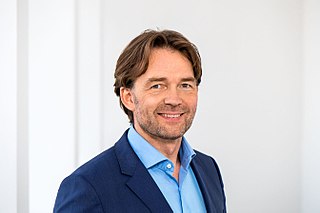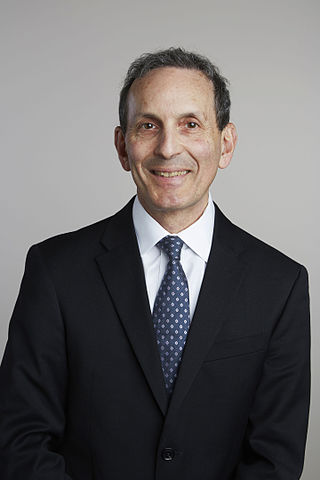
Endocrinology is a branch of biology and medicine dealing with the endocrine system, its diseases, and its specific secretions known as hormones. It is also concerned with the integration of developmental events proliferation, growth, and differentiation, and the psychological or behavioral activities of metabolism, growth and development, tissue function, sleep, digestion, respiration, excretion, mood, stress, lactation, movement, reproduction, and sensory perception caused by hormones. Specializations include behavioral endocrinology and comparative endocrinology.
Kallmann syndrome (KS) is a genetic disorder that prevents a person from starting or fully completing puberty. Kallmann syndrome is a form of a group of conditions termed hypogonadotropic hypogonadism. To distinguish it from other forms of hypogonadotropic hypogonadism, Kallmann syndrome has the additional symptom of a total lack of sense of smell (anosmia) or a reduced sense of smell. If left untreated, people will have poorly defined secondary sexual characteristics, show signs of hypogonadism, almost invariably are infertile and are at increased risk of developing osteoporosis. A range of other physical symptoms affecting the face, hands and skeletal system can also occur.
Pediatric endocrinology is a medical subspecialty dealing with disorders of the endocrine glands, such as variations of physical growth and sexual development in childhood, diabetes and many more.

Zvi Laron is an Israeli paediatric endocrinologist. Born in Cernăuţi, Romania, Laron is a professor emeritus at Tel Aviv University. In 1966, he described the type of dwarfism later called Laron syndrome. His research opened the way to the treatment of many cases of growth hormone disorders. He was the first to introduce the multidisciplinary treatment for juvenile diabetes.
The Endocrine Society is a professional, international medical organization in the field of endocrinology and metabolism, founded in 1916 as The Association for the Study of Internal Secretions. The official name of the organization was changed to the Endocrine Society on January 1, 1952. It is a leading organization in the field and publishes four leading journals. It has more than 18,000 members from over 120 countries in medicine, molecular and cellular biology, biochemistry, physiology, genetics, immunology, education, industry, and allied health. The Society's mission is: "to advance excellence in endocrinology and promote its essential and integrative role in scientific discovery, medical practice, and human health."

George P. Chrousos is professor of Pediatrics and Endocrinology Emeritus and former chairman of the Department of Pediatrics at the Athens University Medical School, Greece. Earlier he was senior investigator, director of the Pediatric Endocrinology Section and Training Program, and chief of the Pediatric and Reproductive Endocrinology Branch of the National Institute of Child Health and Human Development (NICHD), National Institutes of Health (NIH). He is also clinical professor of Pediatrics, Physiology and Biophysics at Georgetown University Medical School and distinguished visiting scientist, NICHD, NIH. Dr. Chrousos was the first general director of the Foundation of Biomedical Research of the Academy of Athens (2001–2002). He holds the UNESCO Chair on Adolescent Health Care, while he held the 2011 John Kluge Chair in Technology and Society, Library of Congress, Washington, D.C.
Reproductive endocrinology and infertility (REI) is a surgical subspecialty of obstetrics and gynecology that trains physicians in reproductive medicine addressing hormonal functioning as it pertains to reproduction as well as the issue of infertility. While most REI specialists primarily focus on the treatment of infertility, reproductive endocrinologists are trained to also test and treat hormonal dysfunctions in females and males outside infertility. Reproductive endocrinologists have specialty training (residency) in obstetrics and gynecology (ob-gyn) before they undergo sub-specialty training (fellowship) in REI.

Francine Ratner Kaufman is an American endocrinologist, professor, author, researcher, consultant, and corporate officer in the medical field of diabetes mellitus. She is the author of Diabesity: The Obesity-Diabetes Epidemic That Threatens America. She is currently chief medical officer at Medtronic's diabetes business.

Dr. Hossein Gharib is a physician who specializes in thyroid disorders. He was born in Tehran, Iran, on February 2, 1940, and is a consulting physician at the Mayo Clinic in Rochester, Minnesota.
Mitchell Lazar is an endocrinologist and physician-scientist known for his discovery of the hormone resistin and his contributions to the transcriptional regulation of metabolism.
Shashank R. Joshi is an Indian endocrinologist, diabetologist and medical researcher, considered by many as one of the prominent practitioners of the trade in India. He was honoured by the Government of India, in 2014, by bestowing on him the Padma Shri, the fourth highest civilian award, for his services to the field of medicine. He is a part of the COVID-19 Task Force for the state of Maharashtra, India.
The American Association of Clinical Endocrinology (AACE), formerly known as the American Association of Clinical Endocrinologists, is a professional community of physicians specializing in endocrinology, diabetes, and metabolism. AACE's mission is elevating clinical endocrinology to improve global health. The association is headquartered in Jacksonville, Florida, US.

Matthias H. Tschöp is a German physician and scientist. He is the chief executive officer and scientific director of Helmholtz Zentrum München, German Research Center for Environmental Health. He is also Alexander von Humboldt Professor and chair of metabolic diseases at Technical University of Munich and serves as an adjunct professor at Yale University.
The European Journal of Endocrinology is a monthly peer-reviewed medical journal covering endocrinology with a focus on clinical and translational studies, research, and reviews in paediatric and adult endocrinology. It is the clinical journal of the European Society of Endocrinology. The editor-in-chief is Wiebke Arlt. The journal has been published by Bioscientifica since 1999.
Narayana Panicker Kochupillai, popularly known as N. P. Kochupillai, is an Indian clinical endocrinologist, Professor Emeritus of the National Academy of Medical Sciences and a former head of the department of Endocrinology and Metabolism at the All India Institute of Medical Sciences, New Delhi, known to have contributed to the understanding of endemically prevalent endocrine and metabolic disorders. A winner of 2002 Dr. B. C. Roy Award, he was honoured by the Government of India in 2003 with Padma Shri, the fourth highest Indian civilian award.
The Society for Endocrinology is an international membership organisation and registered charity representing scientists, clinicians and nurses who work with hormones. The Society was established in 1946, and currently has approximately 3,000 members.

Endocrine-Related Cancer is a monthly peer-reviewed medical journal covering cancers in endocrine organs — such as the breast, prostate, pituitary, testes, ovaries, and neuroendocrine system — and hormone-dependent cancers occurring elsewhere in the body. Its scope covers basic, translational, clinical and experimental studies.

Daniel Joshua Drucker is a Canadian endocrinologist. A Fellow of the Royal Society, he is a professor of medicine at the Lunenfeld-Tanenbaum Research Institute, Mount Sinai Hospital, Toronto. He is known for his research into intestinal hormones and their use in the treatment of diabetes and other metabolic diseases.
Christian Hamburger was a Danish endocrinologist. He worked in Copenhagen and was the doctor responsible for Christine Jorgensen's sex reassignment, and she would choose her name in honor of him.
Sanjay Kalra is an Indian endocrinologist working at Bharti Hospital, Karnal, Haryana. Kalra is the Immediate Past President of Endocrine Society of India and Vice President of South Asian Federation of Endocrine Societies. He also serves on the executive council of the Research Society for Study of Diabetes in India. He has over 1000 PubMed indexed articles to his name, and has fostered bilateral and multilateral links between various Afro Asian countries in the field of endocrinology. He has developed the terms Glucocrinology and Lipocrinology. and the Gluco Coper tool to assess coping mechanisms. Winner of the DAWN Award (2009). He has also published the concepts of diabetes fatigue syndrome, euthymia in diabetes, quaternary prevention in endocrinology, and quinary prevention.







